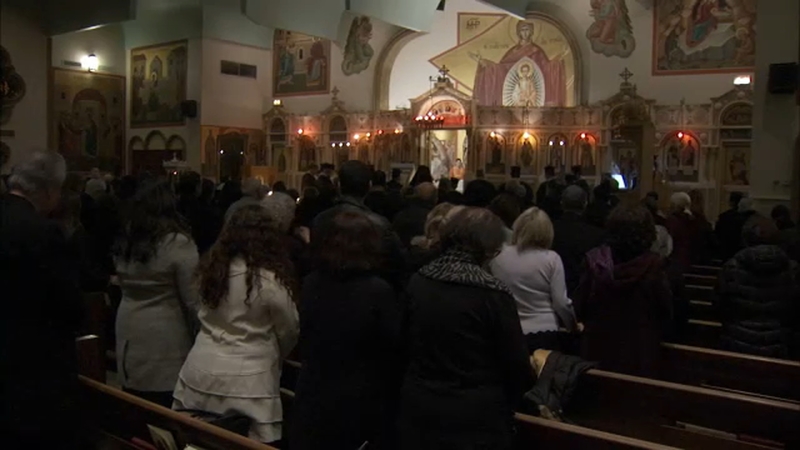The following homily was delivered in Ukrainian by Fr. Serhiy Kovalchuk, Chancellor of Ukrainian Greek-Catholic Eparchy of Chicago and pastor of St. Nicholas Cathedral on Sunday, September 15, 2019. Fr. Serhiy was addressing an an annual ecumenical gathering organized by the Ukrainian Genocide Famine Foundation - USA in honor of the Holodomor: Stalin's man-made famine that left millions of Ukrainians dead from 1932-1933.

Our immigration here in Chicago is very diverse. Yes, most of us are from Galicia (in Western Ukraine). Those of us from Galicia know about the Holodomor from the accounts of others. We heard stories how Metropolitan Andrey Sheptytsky, for example, gathered food, money, and other goods to send to his fellow Ukrainians who never ended up receiving the aid.
We can think about the Holodomor in the context of anthropology, sociology, or other social sciences. We can even think about the famine from a medical standpoint. But I’d like to pose one question here, to those of us who experienced the famine firsthand, and to those whose families were spared: what transpired to lead to this famine? Yes, we remember the victims of the famine, as we should. All of Ukraine is honoring the victims of this famine. But why did it happen?
In the Old Testament, the Jews believed that a nation’s suffering owes to some sin. It’s interesting, therefore, that Jews barely spoke of the Holocaust immediately following WWII. It wasn’t until after the 1960s that the Jews began to consider if their suffering owed to their sins. So the question struck me: “Lord, what kind of sins has our nation committed to have deserved centuries of suffering, especially in 1932-1933? What is the sin?” I think that we Ukrainians, should stand honestly before one another. Do we have such sins, that God would have allowed such a terrible fate that mothers would resort to cannibalizing their children? Everybody should ask themselves this question.

What is the fault of Ukrainians? Ukrainians always say, “on town’s edge I live, notice I’ll not give.” This kind of irresponsibility—that many, though not all ascribe to—led to the hunger and death of many people in 1932 and 1933. Perhaps this could have been prevented in 1917 (the first declaration of Ukrainian independence) when Ukrainians had an opportunity to decide what kind of society they wanted to build. They couldn’t decide. That’s why people suffered in 1932 and 1933. Today, we pray for these victims. They are blameless. They ended up in that unfortunate historical moment. They perished. My aunt once showed me where my great-great grandfather was buried in a cemetery near Khmelnytsky. He died during the famine. This is personal for me.
But how are we supposed to look at this today? Often, the only people who participate in memorials are elderly. Look around you. There are some young people, but they’re mostly older. Why don’t young people want to honor the past? Because young people think about the future. How can we project the Holodomor into the future? It teaches one important thing: responsibility for one’s attitude. Responsibility for who a person is and who he wants to become. And when we do that, we have good results. We look at Ukraine today and see that, thank God, there’s a new generation of people who take responsibility for themselves and others. This is exceedingly important. We see how Ukrainians have stopped their enemy in their tracks. In the last five years since the war in Donbas began to afflict our people, we have become a nation. We are becoming a nation. It’s important to understand that your truth can only be when you manage your own household. So long as we have this kind of nation, I can surely tell you, there will not be a second Holodomor. We won’t let it pass. We will rise to stop it, just like we stopped it this time.
Take the example of life here in America, though. Ukrainians understand. They’re there, we were once there, but now we’re here. All of us who live in America have our own problems: debt, mortgages, work. What does this genocide have to teach us? This is where I’m going to broach a topic that won’t be very popular.
What is the biggest problem in our community organizations? There are few people. I think almost everybody who works in the community says “there are no people, and I can’t find anybody to help me.” What is the problem in our parishes in recent years? There aren’t enough people. Critically speaking, this is a kind of self-genocide. We’re vanishing. Once life in Ukraine gets better, we’ll all begin to actively disappear.
A few days ago, I had the opportunity to visit a Greek church. In it, there’s a wonderworking icon where the Mother of God has begun to weep myrrh. I think most people have heard about this. As a priest and Christian, I wanted to visit this icon. For many years, I was attached to St. George Cathedral in Lviv where there’s also a wonderworking icon of Terebovlya.
We came for a service at night. Everything was in Greek. I prayed, and everything was nice. The cantor’s singing was lovely. As a priest, I wanted to know what they were praying. I know a few words of Greek, and figured out they were praying matins. Then the priest came down and preached. He spoke in Greek. More than half of the church were non-Greeks. They didn’t understand a word. When everything was finished, we walked up to the icon and prayed. On our way out, I noticed a small flyer—it was the only thing in English. It read, “we currently have 160 families, but we need 200 families to sustain the parish.” And indeed, the next day they closed the parish, and that’s why the icon weeps.
Every nationality in America has this same problem. We Ukrainians face this, no matter if we’re Orthodox or Greek-Catholic. How can we, taking into account this concept of genocide, come to understand what we need to do if we want to continue existing? On one hand, to be Ukrainian, but also in America. To be Christians, but to carry with us this Eastern prayer life, theology, rites, and spirituality. We have a lot of work to do.
Today we pray for the victims of the Holodomor of 1932-1933. I pray for my great-grandfather, and I pray for all of those victims whose names we know and don’t know. Today, we must look into the future and we must speak the truth. We must find a way to remember the past, build during the present, and aim for the future. May the “eternal memory” for which we pray not only give the victims peace, but also give us strength to look into the past, see the present, and the future.
In blessed sleep grant eternal rest, O Lord, to Your ever-to-be-remembered servants, and make their memory everlasting!






